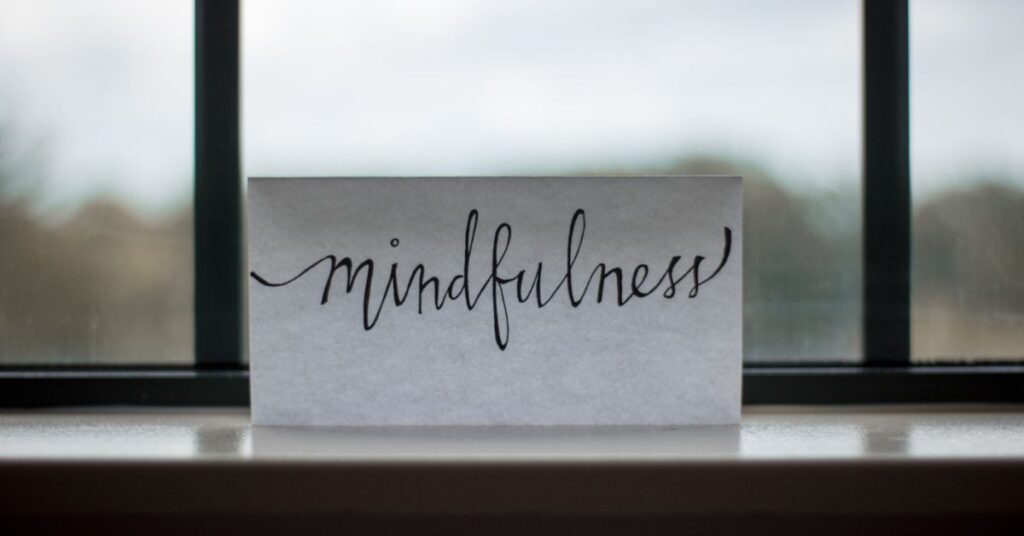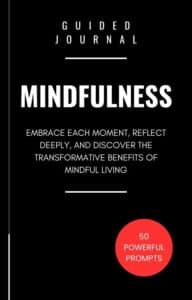Welcome to “50 Transformative Journal Prompts for Mindfulness.” These guided journal prompts are designed to help you cultivate mindfulness in your daily life, fostering a deeper connection with yourself and the world around you. Mindfulness is the practice of being fully present and engaged in the moment, aware of your thoughts, feelings, and surroundings without judgment. It helps reduce stress, improve mental clarity, and enhance emotional well-being.
These prompts are divided into various themes, such as daily reflections, emotional check-ins, self-compassion, and mindful activities. By exploring these prompts, you will embark on a journey of self-discovery, learning to appreciate the present moment and develop a more compassionate relationship with yourself.
Each prompt is designed to be simple yet profound, encouraging you to take a few moments each day to reflect and write. You don’t need to be a seasoned writer to benefit from this journal. The goal is not to create perfect entries but to engage in a process of introspection and mindfulness. Whether you have a few minutes in the morning or evening, or you set aside a dedicated time each week, these prompts will guide you toward a more mindful and fulfilling life.
Understanding Mindfulness
What is Mindfulness?
Mindfulness is the practice of being fully present in the moment. It means paying attention to your thoughts, feelings, and sensations without judging them. Instead of dwelling on the past or worrying about the future, mindfulness encourages you to focus on what is happening right now.
Why is Mindfulness Important?
Mindfulness has many benefits for both your mental and physical health. By practicing mindfulness, you can:
- Reduce stress and anxiety
- Improve focus and concentration
- Enhance emotional regulation
- Boost your overall well-being
- Develop greater self-awareness
How Does Mindfulness Work?
Mindfulness works by helping you become more aware of your thoughts and feelings. This awareness allows you to respond to situations more calmly and thoughtfully, rather than reacting impulsively. When you practice mindfulness, you learn to observe your experiences without getting caught up in them.
Simple Mindfulness Techniques
There are many ways to practice mindfulness. Here are a few simple techniques to get you started:
Mindful Breathing
One of the easiest ways to practice mindfulness is through mindful breathing. Here’s how you can do it:
- Find a quiet place to sit or lie down.
- Close your eyes and take a deep breath in through your nose.
- Exhale slowly through your mouth.
- Focus on the sensation of your breath entering and leaving your body.
- If your mind wanders, gently bring your attention back to your breath.
Body Scan
The body scan is another effective mindfulness technique. It helps you become more aware of your physical sensations. Follow these steps:
- Lie down in a comfortable position.
- Close your eyes and take a few deep breaths.
- Start by focusing on your toes. Notice any sensations you feel, such as warmth or tingling.
- Slowly move your attention up your body, from your feet to your head.
- Spend a few moments focusing on each part of your body.
Mindful Eating
Mindful eating involves paying full attention to the experience of eating. Here’s how you can practice it:
- Choose a meal or snack to eat mindfully.
- Sit down at a table, free from distractions like TV or smartphones.
- Take a moment to appreciate the appearance and smell of your food.
- Eat slowly, savoring each bite. Notice the flavors, textures, and sensations.
- Pay attention to how your body feels as you eat. Are you hungry, full, or satisfied?
How to Incorporate Mindfulness into Your Life
Incorporating mindfulness into your daily routine doesn’t have to be complicated. Here are some tips to help you get started:
- Start small: Begin with just a few minutes of mindfulness practice each day and gradually increase the time.
- Be consistent: Try to practice mindfulness at the same time each day to build a habit.
- Use reminders: Set reminders on your phone or place sticky notes around your home to prompt you to practice mindfulness.
- Be patient: It takes time to develop mindfulness skills, so be patient with yourself and keep practicing.
Mindfulness is a powerful tool that can help you live a more peaceful and fulfilling life. By being present in the moment and paying attention to your thoughts, feelings, and sensations, you can reduce stress, improve focus, and enhance your overall well-being. Start with simple techniques like mindful breathing, body scans, and mindful eating, and gradually incorporate mindfulness into your daily routine. With practice and patience, you can experience the many benefits of mindfulness and live a more mindful life.

Journaling for Mindfulness: A Path to Transformation
What is Journaling?
Journaling is the practice of writing down your thoughts, feelings, and experiences regularly. It can be done in a notebook, a diary, or even digitally. The main goal of journaling is to reflect on your life, express yourself, and gain a deeper understanding of your inner world.
How Does Journaling Work?
When you journal, you take time to pause and reflect on your day, your emotions, and your experiences. This process helps you become more aware of your thoughts and feelings, which is a key aspect of mindfulness. By putting your thoughts into words, you can organize them, understand them better, and see patterns that you might not have noticed before.
The Transformative Benefits of Journaling for Mindfulness
1. Enhances Self-Awareness
Journaling helps you become more aware of your thoughts and feelings. When you write about your experiences, you start to see patterns in your behavior and emotions. This increased self-awareness allows you to understand yourself better and make more mindful choices.
Example: You might notice that you feel anxious every Monday morning. By journaling, you can explore why this happens and find ways to manage or reduce your anxiety.
2. Reduces Stress and Anxiety
Writing about your worries and fears can help you release them. Journaling provides a safe space to express your emotions without judgment. This can reduce stress and anxiety by allowing you to process and let go of negative feelings.
Example: If you’re feeling overwhelmed with work, writing about your stress can help you clarify what’s causing it and identify steps to address the issues.
3. Improves Focus and Concentration
When you journal regularly, you practice focusing on your thoughts and feelings. This practice can improve your overall concentration and attention to detail in other areas of your life. By training your mind to stay present, you enhance your ability to focus.
Example: By writing about your daily tasks and setting intentions, you can stay more focused and organized throughout the day.
4. Fosters Emotional Regulation
Journaling helps you understand and manage your emotions better. By acknowledging your feelings and writing them down, you can gain perspective and respond to situations more calmly. This emotional regulation is a key component of mindfulness.
Example: If you’re angry or upset, journaling can help you cool down and process your emotions in a healthy way.
5. Encourages Personal Growth
Journaling allows you to reflect on your experiences and learn from them. This reflection promotes personal growth and helps you make positive changes in your life. By regularly writing about your goals, achievements, and challenges, you can track your progress and stay motivated.
Example: Keeping a gratitude journal can help you focus on the positive aspects of your life and cultivate a more optimistic outlook.
How to Start a Mindfulness Journal
1. Choose Your Medium
Decide whether you prefer a physical notebook, a digital document, or a journaling app. Choose a format that feels comfortable and accessible to you.
2. Set Aside Time
Dedicate a specific time each day or week for journaling. This could be in the morning, before bed, or during a quiet moment in your day. Consistency is key to making journaling a habit.
3. Create a Comfortable Space
Find a quiet and comfortable place where you can write without distractions. This will help you focus and make the most of your journaling time.
4. Start with Simple Prompts
If you’re not sure what to write about, start with simple prompts related to mindfulness. Here are a few examples:
- What am I feeling right now?
- What thoughts are on my mind?
- What am I grateful for today?
- What was a positive moment from my day?
5. Write Freely
Don’t worry about grammar, spelling, or writing perfectly. The goal is to express yourself honestly and openly. Write whatever comes to mind and let your thoughts flow naturally.
6. Reflect and Review
Take time to read what you’ve written and reflect on it. Notice any patterns or insights that emerge. Use these reflections to guide your mindfulness practice and personal growth.
Journaling is a powerful tool for enhancing mindfulness. By regularly writing about your thoughts, feelings, and experiences, you can increase your self-awareness, reduce stress, improve focus, and foster emotional regulation. Starting a mindfulness journal is simple and can be tailored to fit your preferences and lifestyle. Dedicate time to journaling, choose a comfortable space, and use prompts to guide your writing. As you make journaling a habit, you’ll discover its transformative benefits and enjoy a more mindful and fulfilling life.

Journal Writing Prompts for Mindfulness
Download Printable Journal Prompts (PDF) >>
- Morning Intention: What is one positive intention you want to set for today?
- Evening Gratitude: What are three things you are grateful for that happened today?
- Mindful Observation: Describe in detail something you can see, hear, or feel right now.
- Body Scan: What sensations are you experiencing in different parts of your body at this moment?
- Emotional Check-In: What emotions are you feeling right now? Where do you feel these emotions in your body?
- Processing Feelings: What might have triggered these emotions? How can you acknowledge and honor them?
- Self-Kindness: Write a compassionate letter to yourself about a recent challenge you faced.
- Acceptance: What is one thing you can forgive yourself for today?
- Mindful Eating: What are the flavors, textures, and smells of your food today? How do you feel while eating?
- Mindful Walking: What do you notice as you walk today? Pay attention to your surroundings and how your body moves.
- Nature Reflection: Describe a moment today when you felt connected to nature. What did you observe and feel?
- Grounding Exercise: Imagine yourself as a tree with roots extending deep into the earth. How does this imagery make you feel?
- Values and Goals: What values are most important to you? How can you live more aligned with these values today?
- Purpose: What activities make you feel most fulfilled? How can you incorporate more of these into your life?
- Stress Awareness: What situations are currently causing you stress? How can you approach these situations mindfully?
- Calming Practices: Describe a mindfulness technique that helps you when you feel anxious. How can you integrate it into your daily routine?
- Positive Experiences: Recall a positive experience from the past week. How did it make you feel, and why was it meaningful?
- Gratitude List: List five things you are grateful for today. How do these things enrich your life?
- Connecting with Others: How can you be more present in your interactions with others today?
- Appreciation: Who in your life are you grateful for? Write about what they mean to you.
- Exploring Beliefs: What are some of your core beliefs? How do they influence your actions and decisions?
- Personal Strengths: What are your strengths? How can you use them to enhance your mindfulness practice?
- Free Writing: Spend 10 minutes writing whatever comes to mind without judgment.
- Artistic Expression: Draw or doodle something that represents your current state of mind.
- Morning Reflection: What is one thing you are looking forward to today?
- Evening Reflection: What was the highlight of your day?
- Mindful Breathing: Focus on your breath. Describe how it feels to breathe in and out slowly and deeply.
- Letting Go: What is something you need to let go of? How can releasing this improve your well-being?
- Self-Discovery: What is something new you learned about yourself recently?
- Mindful Listening: How can you improve your listening skills to be more present in conversations?
- Mindful Movement: How does your body feel after physical activity? Describe the sensations.
- Nature Walk: What do you observe during a walk in nature? How does it make you feel?
- Mindful Senses: Choose one of your senses (sight, sound, touch, taste, smell) and focus on it for a few minutes. What do you notice?
- Mindful Pause: Take a few minutes to pause and breathe deeply. How does this affect your mood?
- Positive Affirmations: Write down three positive affirmations for yourself today.
- Reflection on Kindness: When was the last time someone showed you kindness? How did it affect you?
- Self-Compassion Reminder: What is one thing you can do to show yourself compassion today?
- Reflection on Growth: How have you grown or changed in the past year?
- Mindful Goal Setting: Set a mindful goal for the week. How will you achieve it?
- Inner Peace: What activities bring you a sense of inner peace? How can you make time for them?
- Mindful Reading: Choose a quote or passage from a book that inspires you. Reflect on its meaning.
- Self-Care Plan: What are three self-care activities you can plan for this week?
- Reflection on Resilience: How have you demonstrated resilience recently? What did you learn from the experience?
- Gratitude for the Body: Write about one aspect of your body you are grateful for and why.
- Reflection on Change: How do you handle change? Reflect on a recent change and how you navigated it.
- Mindful Technology Use: How can you be more mindful in your use of technology today?
- Reflection on Silence: Spend a few minutes in silence. What thoughts or feelings arise?
- Gratitude for Challenges: Write about a challenge you faced and the strengths you discovered through it.
- Mindful Creativity: How can you incorporate mindfulness into a creative activity you enjoy?
- End-of-Day Reflection: As you end your day, reflect on one thing you did well and one thing you can improve on tomorrow.
These prompts are designed to guide you through a mindful journey, fostering self-awareness, emotional balance, and a deeper connection with your inner self and the world around you.
Guided Journal for Mindfulness
50 Writing Prompts to Embrace Each Moment, Reflect Deeply, and Discover the Transformative Benefits of Mindful Living

Discover the Power of Mindfulness Through Daily Reflection
Are you looking for a way to bring more calm, clarity, and presence into your life? The “Guided Journal for Mindfulness” is your perfect companion on a journey to inner peace and self-discovery. This thoughtfully designed journal provides you with 50 transformative prompts that encourage you to pause, reflect, and embrace the present moment. Whether you are new to mindfulness or looking to deepen your practice, this journal offers a structured yet flexible approach to cultivate mindfulness every day.
How to Use This Journal
Create a Daily Practice
Set aside a few minutes each day to complete the prompts. Consistency is key to developing a mindful habit. Whether it’s in the morning, during a lunch break, or before bed, find a time that works best for you.
Reflect and Review
Take time to read through your entries periodically. Reflect on your growth and the insights you’ve gained. This practice helps reinforce your mindfulness journey and encourages continuous self-improvement.
Personalize Your Journey
Feel free to adapt the prompts to suit your needs. The “Guided Journal for Mindfulness” is designed to be flexible, allowing you to explore and deepen your mindfulness practice in a way that resonates with you.
Why Choose This Journal?
The “Guided Journal for Mindfulness” is more than just a journal; it’s a tool for transformation. Each prompt is carefully crafted to help you cultivate mindfulness, enhance self-awareness, and live a more intentional life. Whether you’re seeking to reduce stress, improve emotional well-being, or simply bring more presence into your daily routine, this journal is your companion on the path to inner peace and self-discovery.
Start your mindfulness journey today with the “Guided Journal for Mindfulness” and unlock the power of being present. Embrace each moment, reflect deeply, and discover the transformative benefits of mindful living.
Congratulations on completing “50 Transformative Journal Prompts for Mindfulness.” By engaging with these prompts, you have taken significant steps toward enhancing your mindfulness practice and fostering a deeper connection with yourself. Throughout this journey, you have explored various aspects of your life, from daily reflections and emotional awareness to self-compassion and intentional living.
Mindfulness is an ongoing practice, and the insights you have gained through this journal are valuable tools for your continued growth. Remember that mindfulness is not about achieving a perfect state of being but about being present and accepting each moment as it comes. The skills and awareness you have developed here can be integrated into your daily life, helping you navigate challenges with greater ease and appreciate the simple joys around you.
Continue to explore new prompts and techniques to deepen your mindfulness, and remember that every moment is an opportunity to practice being present. Thank you for allowing these journal prompts to be a part of your mindfulness journey. May they continue to inspire and support you in living a more mindful, peaceful, and fulfilling life.

